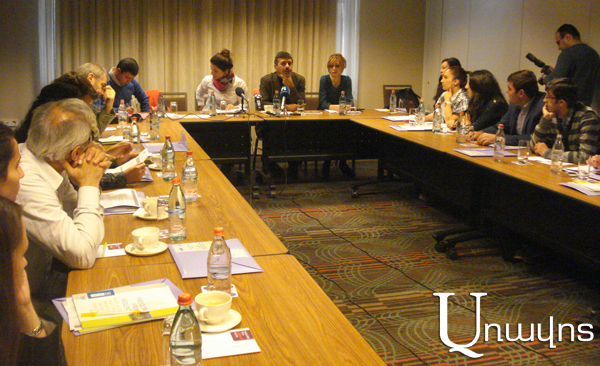“Any issue in Armenia is resolved through violence, ranging from the fight against electricity price rise, ending with any other issue. The force as a birth-bearing right is still on. ‘I will break your head’ is sitting very close in us”, so responded Artak Kirakosyan, Chairman of “Civil Society Institute” NGO, in response to the question of Aravot.am of what are the tendencies of whether reduction of violence is observed in our country, or vice versa.
Note that today the UN Armenian Association, in cooperation with Civil Society Institute, organized a round-table discussion dedicated to “Post-2015″ development planning. Ombudsman’s office, civil society representatives discussed the mechanisms and tools for the conflict prevention and settlement.
In his speech, Artak Kirakosyan presented violence in the process of recognition of the Genocide and in internal political life in the Armenian – Azerbaijani relations. The internal political dialogue was highlighted here, reminding of March 1, Shant Harutyunyan’s and October 27 events. In other words, the violence has become a means of solving political problems.” To the observation of Aravot.am that the perpetrator is not disclosed for none of these cases, Mr. Kirakosyan responded, “As for March 1, we know who the perpetrators are, it’s another question how the society treats this violence and sees the solutions. Obstinacy is still sitting in us.”
Artak Kirsakosyan singled out the police violence, tortures, use of force and the violence against children. He expressed concern that not a dialogue, but the culture of compromise is developing in us. Amalia Grigoryan, Coordinator of the Conflict Prevention Program of the UN Armenian Association, emphasized that the “Post-2015 development agenda” will replace the Millennium Development Goals, whose deadline for implementation is 2015.” Later on, she detailed, “Now, the international community, in the face of the United Nations, has put the continuation under discussion to provide the Millennium Development Goals. The main goal of the format is to reduce extreme poverty in the world. Extreme poverty reduction requires a systematic approach. The problem should be solved simultaneously with other problems: health care, access to health care, access to three levels of education and so on.”
Anna Safaryan, the Ombudsman Senior Advisor, highlighted the Ombudsmen-NGO cooperation and mentioned, “Since 2011, by the instruction of Karen Andreasyan, a new format of memorandum of cooperation was accepted, in the result of which the cooperation intensified. It information available with NGOs is an important base for us, based on which we will try to help people.” Artak Kirakosyan is sure that as long as we do not master the mechanisms of international court, expecting accusation for March 1 sinners is senseless. Later on, he added, “The International Criminal Court will never judge Robert Kocharyan for March 1. Whereas, the politicians are often uselessly manipulating the International Criminal Court on their agendas, saying that they will sent Kocharyan there, have submitted an applications and the application was accepted.”
Tatev HARUTYUNYAN






















































